Optimal Water Intake Calculator
Navigating the vast sea of health recommendations, especially when it comes to hydration, can be overwhelming. However, understanding how much water your body needs daily is a fundamental step towards overall well-being. Introducing the “Optimal Water Intake Calculator,” a tool designed to demystify the ideal water intake tailored to your unique needs. Whether you’re an avid athlete, working professional, or simply aiming for optimal health, this optimal water intake calculator takes into account factors like your weight, activity level, and local climate to provide personalized hydration guidance. Let’s dive into the details and discover how staying adequately hydrated can be effortlessly calculated and incorporated into your daily routine.
Some of this (~20%) can come from food intake, so the adjusted recommendation is closer to 100 ounces for men and 75 ounces for women – both of which are higher than the eight glasses a day!
To improve your hydration for optimal water intake I recommend you get into the habit of: Always carrying a water bottle with you where ever you go Cut back on drink with caffeine. Add more fruits and vegetable into your daily meals and snacks Track your daily intake Monitor your urine The amount of water you need to intake will vary according to a number of different factors such as: Environment Dehydration is more common at high altitudes.
When you drink water, your stomach fills up with liquid rather than food, so you are less likely to overeat or eat too much. By using our optimal water intake calculator and consulting a professional you can determine how much water you should drink in a day to keep your kidneys health. Dehydration is the loss of fluid from your body, and it can result in negative physical and mental effects.
Once you feel thirsty you start drinking water, right? What you need to know is that this is a warning that you are dehydrated. So you need to get into the habit of drinking water on a regular basis so you are not dehydrated.
Here are some facts:
- The human body is made of about 70% water.
- Insure when consuming dehydrated fluids such as; coffee, alcoholic drinks, sodas, and others to have water when you are thirsty as these beverages will not hydrate your body.
- Having a glass of water before a meal can control eating, weight management, and the digestion process.
- Depending on your level of activity it can vary; drinking the recommended amount of water which is about 2 liters or 8 glasses per day can aid in weight loss to allow the body to metabolize fat adequately.
- Some dehydration symptoms include; headaches, stomachache, behavior changes, depression.
- Losing a significate amount of body water of about 22-30% can lead to coma and even death

Discover How I Can Help You Lose Weight
How to meal prep – even if you don’t have any nutrition background!
A little-known way to lose weight – you’ll be amazed!
A stupidly simple trick for losing your belly fat.
What the professionals in fitness do when they want to lose weight.
The secrets of losing belly fat. This one will blow you away!
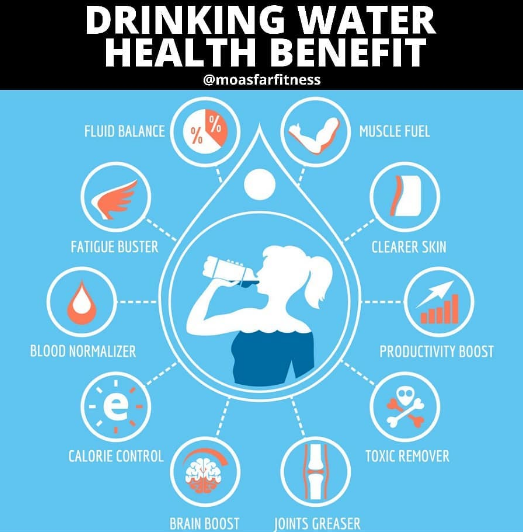
Get your personal daily water goals in just a few minutes.
Just enter your details into the form below.
Then, you will see your results instantly.
DAILY WATER INTAKE FOR YOU
You should drink ...... of water per day
⚠️Note: Always check with your doctor; these results are not a substitute to any direct medical advice from your doctor or medical provider. If you have any problem influenced by water intake do insure you you receive medical or doctor recommendations.
How to Calculate Water Intake
The optimal water intake calculator uses a formula to estimate your fluid needs. Here is how it works:
According to your input formula is calculated:
- Sex
- Age Group
- Height
- Weight
- Season/Temperature
- Activity Level
How Much Water Should You Drink a Day Calculator?
To reach your optimal water intake generally, it all depends on your weight don’t worry too much about the 8 glasses per day method which has no scientific backup. Roughly most people need to drink two-thirds of their weight (in pounds) in ounces.
Below is a guideline on how our calculator works:
Process-1
Step-1
Calculate BMI- Weight (in Kg)/Height * Height (in meter)
If the result is <25 then We will skip to step -2 (for the result of process-1)
If the result is >25 then ; the result for process-1 = Weight (in pound)*0.666666 = result in ounce (oz)
—-
If the result was <25 then follow this table to get the result of process-1
| Age Group | Water intake in ml | |
| Female | 14-18 | 2300 |
| 19-30 | 2700 | |
| 31-50 | 2700 | |
| 50+ | 2700 | |
| Male | 14-18 | 3300 |
| 19-30 | 3700 | |
| 31-50 | 3700 | |
| 50+ | 3700 |
Now we get results for Process-1
————————————————————————————————————
Process-2
Season-
If Winter – (-10% Change of process-1)
If Normal – (0% Change of process-1)
If Summer- (+10% Change of process-1)
Now we get result for process-2
———————————————————————————————————————-
Process-3
Activity Level-
If Lightly Active (Sedentary) – (0% Change of process-2)
If Moderately Active – (+10% Change of process-2)
If Very Active- (+20% Change of process-2)
————————————————————–
The final result will be shown in Liter. (1000ml = 1 ltr) for metric option and
in Ounce for Imperial option.
-If it is liter then- round of with one digit after the decimal point- for 3.9870 to 3.9 liter
– If it is Ounce then – Round of the whole number- 104.6745 ounces to 105 Ounce
Consuming water is essential to survive. It regulates your body temperature allowing your muscles and organs to function properly. You need water to support all your body functions from; sleeping, digestion, metabolism.
Water consumption can even support healthy weight management. The great thing about water it’s calorie-free. So drinking regularly with the right amount for you can help you before eating your meal decrease your calorie intake leading to weight loss.
How Much Water Should I Drink Per Day?
When it comes to nutrition recommendations it is very unlikely that a one-size-fits-all approach is implemented. What works for someone you know may not work for you. It all depends on; the level of activity, general health, weight, age…etc.
I know people that barely drink water and they are doing well and living while others need to nourish their bodies every other hour or so.
Do keep in mind that we do consume water from our food as well, you may have heard people say “eat your water”. Which can be found in veggies and fruits.
In 2015, the National Academy of Medicine (NAM) and the National Academy of Science (NAS) released a study that stated the average amount of water people should consume for optimal health. According to this report, 125 ounces is the recommended daily water intake for men, while 91 ounces is needed for women.
It’s important to note that not all of these nutrients are absorbed by the body. Some of this (~20%) can come from food intake, so the adjusted recommendation is closer to 100 ounces for men and 75 ounces for women – both of which are higher than the eight glasses a day!
Medical experts at Harvard Health recommend 4 to 6 cups of water per day as a general guideline for healthy individuals. According to Mayo Clinic, eight glasses of 8 ounces of water per day is a good baseline to start, while the Institute of Medicine of the National Academies of Sciences suggests that ideal daily water intake ranges from 2.7 liters (11 cups) to 3.7 liters (almost 16 cups) per day.
Among the medical community, your water daily intake per day can vary!
How Much Water Do You Need to Drink a Day?
Good hydration can improve your mood, sleep, and overall health and wellness. Find out if your water intake is adequate by using this simple tool.
It’s important to drink enough water every day, but fluid from water-rich foods will help you hit your hydration goal.
Calculating the amount of water you need to drink daily is more complicated than you may think. That’s because hydration needs are far from one-size-fits-all.
In general, the National Academies of Sciences, Engineering, and Medicine suggest that each day women get a total of about 2.7 liters (L), or 11 cups, of fluid and men get about 3.7 L (16 cups). Not all of that fluid has to be water intake; other beverages and the fluid in whole, nutrient-rich foods count as well.
The Importance of Staying Hydrated
While water intake needs vary, one thing is for sure: Meeting your personal hydration needs each day will have a tremendous benefit to your health.
Indeed, as the Harvard School of Public Health points out, good hydration keeps the body functioning properly, lubricates joints, and regulates body temperature. The university also notes that good hydration helps you sleep better, think more clearly, and even puts you in a better mood!
Don’t Flood Your System All at Once
Drinking water gradually throughout the day is important. Too much water at one time may increase the risk of a condition called hyponatremia, which occurs when the electrolytes in the body become depleted. As the Mayo Clinic states, hyponatremia may be life-threatening.
How Much Water Should I Drink?
I always recommend to have a bottle of water with you where ever you go incase thrust strikes. There are ways to track your water intake with signs of some dehydration to look out for such as:
- Thirst
- Dry mouth
- Not urinating
- Dry skin
- Headaches
- Lack of energy
- Dark yellow urine
- Feeling dizzy
Stay on top of your water needs using our nutrition app!
Log your daily food and beverage intake – including water. The app even provides a weekly chart for you to track your fluid intake over time and see what days you missed the mark.
Download the app now to get started!
Water is needed to keep your body healthy. It is used in many ways, including excreting waste through sweating, breathing, urinating, and pooping.
In order to make sure your body functions at its best, you should ensure that you replace any water you lose by consuming beverages and foods that contain water.
In order to ensure adequate hydration, the National Academies of Sciences, Engineering, and Medicine suggest that men drink 3.7 liters (15.5 cups) of water per day, while women drink 2.7 liters (11.5 cups).
These numbers include the consumption of drinks and food. Around 20% of intake fluid on a daily basis is from food and 80% comes from drinks.
Daily Water Intake
All of the organs, tissues, and cells in your body need water to work. If you do not consume enough water, you will become dehydrated. This can make you feel lethargic and cause you to lack energy.
You can improve hydration with water-rich foods. Drinking water alone is not enough to keep you hydrated. While it’s easy to drink a glass of water and consider your daily fluid needs met, the truth is that there are many other ways to get hydration from food sources.
Consuming hydrating fruits and vegetables with high water content, drinking beverages that have milk, tea, and fresh juice can contribute to you reaching your daily water intake. Other foods such as; celery, tomatoes, strawberries, watermelon, oranges, and grapefruit can all play a role in optimal hydration.
On average about 20% of your fluid comes from foods and beverages – not water!
To improve your hydration I recommend you get into the habit of:
- Always carrying a water bottle wit you where ever you go
- Cut back on drink with caffeine
- Add more fruits and vegetable into your daily meals and snacks
- Track your daily intake
- Monitor your urine
The amount of water you need to intake will vary according to a number of different factors such as:
Environment
Dehydration is more common at high altitudes. It all depends on the weather condition you live in or the season. If it’s humid or hot, your body will start to sweat and this is a sign that you need to consume water.
Activity levels
When you engage in any activity that makes you sweat, it is important to replenish the fluids lost through sweating. You should drink water before, during, and after working out.
Overall health
If you are not well or have a fever, your body will lose water. Make sure you remain hydrated at all times and follow the doctor’s orders.
Pregnancy or Breastfeeding
To remain sufficiently hydrated while you are pregnant or breastfeeding you will need to intake extra fluids.
How Much Water to Drink Per Day?
There is a simple way to estimate the amount of water you need to consume per day.
Your water intake varies according to your weight, you will need more water if you are heavy.
By knowing your weight you multiple ⅔ to calculate how much water you need on a daily basis. Find below example, if you weigh 160 pounds:
160 × 2/3 = 107 ounces (3.15 liters) of water per day.
Do take into consideration when you exercise water will leave your body when sweating. So add 12 ounces of water daily for every 30 minutes of working out. If you exercise for a total of 75 minutes daily:
75 / 30 × 12 = 30 ounces of additional water per day.
As per the example, if you weigh 160 pounds and exercise for 75 minutes per day the total amount of water intake will be as follows:
107 ounces + 30 ounces = 137 ounces of water per day.
Do keep in mind that these are not exact numbers. Your water intake should always be according to the level of thirst you are experiencing.
The optimal water intake calculator and information provided are only for guidance. Your water intake will vary on the basis of your health, activity level, and if you are pregnant, breastfeeding, and other factors.
In a nutshell, for optimal fitness performance and a healthy body staying hydrated is crucial. Consuming an acceptable amount of water is critical for your health and well-being. Knowing that our bodies a composed of 60% water, in order for your organs to function properly water intake is needed. If you do not ensure you are consuming enough water in your body it can lead to medical attention.
H.H Mitchell, Journal of Biological Chemistry 158 depicts
“The heart and brain are composed of 73% water, and the lungs are about 83% of water. The muscles and kidneys contain 79%, skin is about 64% of water, and even the bones are 31% watery.”
It is very important to know the amount of water you need to intake daily to maintain a healthy body. Use our Optimal Water Intake Calculator to recommend your per day water intake.
Recommendations Fluid Intake
What and how much to drink during exercise to stay hydrated? A simple question, isn’t it? But it’s hard to give an answer with precise amounts, as so many factors determine your fluid loss (and hence the replacement) during exercise: exercise intensity and duration, external conditions, sex, etc.
So, it is impossible to suggest an intake that will benefit everyone. Fluid intake strategies are highly individual and should be customized. However three ‘rules’ do apply:
- Before exercise: start well-hydrated
- During exercise: prevent a body weight loss of > 1-2%
- After exercise: replace 150% of your body weight loss
Electrolyte (sodium) and carbohydrate-containing beverages are recommended as this supports fluid retention and exercise performance. Carbohydrates also serve as an energy source.
Slightly more detailed recommendations are those provided by the ACSM (American College of Sports Medicine):
The Primary Goal of Fluid Intake Before, During, and After Exercise is to:
Before Exercise:
Pre-hydrating with beverages, if needed, should be initiated at least several hours before the exercise task to enable fluid absorption and allow urine output to return toward normal levels. Consuming beverages with sodium and/or salted snacks or small meals with beverages can help stimulate thirst and retain needed fluid.
During Exercise:
Individuals should develop customized fluid replacement programs that prevent excessive dehydration, i.e. a loss of > 2% body weight from baseline body weight. The routine measurement of pre-and post-exercise body weights is useful for determining sweat rates and customized fluid replacement programs. Consumption of beverages containing electrolytes and carbohydrates can help sustain fluid-electrolyte balance and exercise performance.
After Exercise
If time permits, consumption of normal meals and beverages will restore hydration. Individuals needing rapid and complete recovery from excessive dehydration can drink ̴1.5 L of fluid for each kilogram of body weight lost. Consuming beverages and snacks with sodium will help expedite rapid and complete recovery by stimulating thirst and fluid retention. Intravenous fluid replacement is generally not advantageous, unless medically merited.
If you like to read more:
[source: position stand ACSM – Exercise and Fluid replacement]
Do keep in mind that when you drink sufficient water it assists your body to have the right balance of nutrients. Being hydrated is crucial it allows your body processes to go smooth and transports nutrients to help in digestion and absorption. It’s essential to good circulation and maintains body temperature. To know how mater intake you need per day for your body to improve body function just type in the required details in the field in the optimal water intake calculator and hit the button.
How Much Water Should I Drink Per Day to Lose Weight?
Any weight program you follow will include sufficient water intake they suggest high water consumption lose weight. Some of these diet programs are Atkins, Paleo, Weight Watchers, EatingWell, Southbeach, Medifast, Sonoma, Volumetrics, Spectrum, Nutrisystem, Jillian Michaels, and the Dukan Diet.
Water assists your body in digesting food efficiently. It helps you consume less and can even give you a “full” feeling. Also, proper water intake can contribute to a feeling of having “more energy.” However, you can use our optimal water intake calculator to lose weight and stay healthy. You can also see professional advice.
How Much Water Should I Drink to Try and Lose Weight?
Let us be clear that drinking water alone will not lead to weight loss. Drinking plenty of water can help support your weight loss goals.
Water helps us feel full and satiated. When you are hydrated, you tend to eat less since you don’t confuse signs of dehydration with signs of hunger. At times you may have felt hungry but you were actually dehydrated.
Another benefit of drinking water is that it can suppress your appetite. When you drink water, your stomach fills up with liquid rather than food, so you are less likely to overeat or eat too much.
Staying focused on drinking more water, you are less likely to have the urge or favor sugary drinks and beverages with empty calories. Getting into the habit of having water instead of these high-calorie beverages is a great way to lose weight.
How to Energize Tired Muscles Quickly After Workout?
Studies have shown that when muscle cells do not have enough fluids, they don’t work well. This is due to muscle fatigue, it decreases the balance of fluids and electrolytes.
It’s essential to consume water during exercise to replenish lost fluid from your body. According to The American College of Sports Medicine recommended 17 ounces (in addition to your normal water intake) before and even during any intense sporting workout or activity.
Exercise should be a regular part of your life. Consuming water before you feel thirsty helps to avoid the negative effects of dehydration caused by sweating.
Can Drinking More Water Help Kidney Function?
A study was conducted by The New York Times found that drinking water can help clear toxins, urea and sodium from the body. In addition, decreases your chances of developing kidney stones or suffering from kidney disease. By using our optimal water intake calculator and consulting a professional you can determine how much water you should drink in a day to keep your kidneys health.
Can Drinking Water Make You Look Younger?
A report from The University of Wisconsin found that drinking water is the best way to keep great-looking and youthful skin. They suggested using water in a moisturizer in addition to drinking the proper amounts.
How to Have Regular Bowel Movements?
A body needs two things: fiber and water, for proper bowel movements. Studies show that if your body is short on fiber, then the body pulls water from the stool to make it softer. If your body lacks fiber even when it has sufficient water, then the body may relieve constipation.
How to Remove Toxins From Your Body?
Clean and fresh water intake helps the body to flush out toxins through sweat, urine, and bowel movements.
How to Increase My Energy?
Your body starts to show thirst at around 1-2% dehydration, according to several studies. Dehydration is the loss of fluid from your body, and it can result in negative physical and mental effects. Even before you feel thirsty, mild dehydration can decrease your energy levels, thinking, and mood. The more dehydrated your body gets, the lower your energy levels will be.
How to Improve Brain Function?
According to researchers that found a study in London, students who drank water during exams scored higher on average. It’s hard to say if this is physiological or psychological, but it has been proven to work, so if you want to get good metrics, then why not take a bottle of water with you to the test?
How to Prevent Muscle Cramps?
Cramps are usually caused by dehydration, lack of potassium, and improper stretching. To avoid cramping make sure you stay hydrated and stretch before you start playing.
How to Strengthen Immune System?
Strengthen Immune System; water is key to health, if you are dehydrated, it compromises your immune system. Being properly hydrated benefits your body in several ways.
What Are The Benefits of Drinking Water?
- Oxygenates the blood
- Removes toxins from the blood
- Increases Lymph production
- Cleans eyes
- Cleans mouth
- Helps digest food
- Helps fight insomnia
- Lubricates joints
- Increases Serotonin Production (fights depression)
Fluorine In Water
According to The American Dental Association, fluoride in water decreases the chances of tooth decay by 20 – 40%.
How Do I Know If I Am Dehydrated?
What does dehydration feel like? The first sign of dehydration is thirst, but there are other signs as well. Early symptoms of dehydration include:
- Thirst and dry mouth
- Darker urine
- Reduced urine or sweat output
- Fatigue
- Flushing of the skin
- Elevated body temperature
- Increased breathing rate
- Elevated pulse
- Headache, joint pain and cramps
Dangers of Dehydration
However, there are some very serious potential consequences of dehydration. Remember that it can become severe if you don’t stop to rehydrate. Dehydration can lead to:
There are some very serious potential consequences of dehydration. Note it can be severe if you don’t stop to rehydrate. Dehydration can lead to:
- Diarrhea
- Fever
- Vomiting
- Kidney failure
- Heat exhaustion
- Coma
- Death
Using the above optimal water intake calculator can help you learn how much water should you drink in a day.
Is Bottled Water Better Than Tap Water?
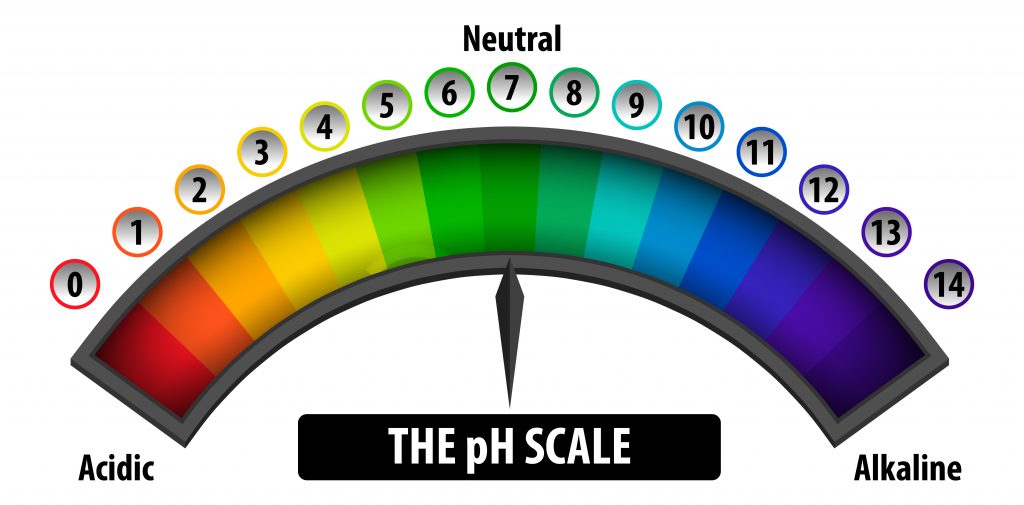
Using the above pH scale ensure the water you are drinking either tap or bottled is in the neutral (green area or above). That would be 7 or above, this is the recommended pH level of water to consume in your body. If you want to know what is the pH level of your bottled water or while grocery shopping just looks in the nutrition fact where it says pH. Some brands have them in front close to their logo as part of their marketing strategy. Below are example images:
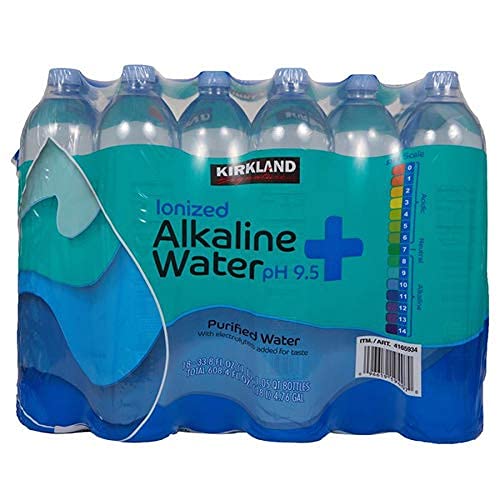
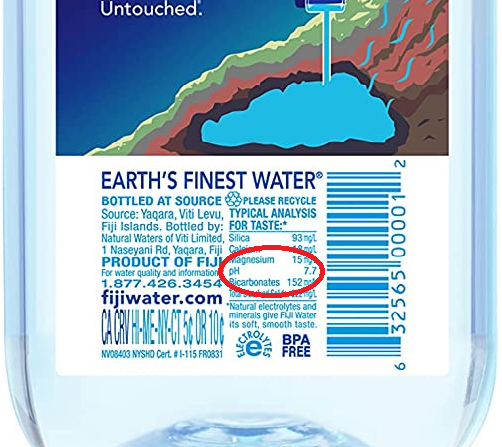
What Are The Benefits of Drinking Enough Water Daily?
Water is essential for our bodies to functions correctly and efficiently. It’s vital to our health and can have a huge impact on our overall health and wellness. Most of us know this, but do you actually know why water is so important. Here are the main benefits of staying hydrated:
- Aids digestion and prevents constipation
- Carries oxygen and nutrients to you cells
- Helps stabilize blood pressure and heartbeat
- Supports healthy joints and joint function
- Helps regulate body temperature
- Potentially lowers the risk for disease in the future such as cancer, heart disease, hugh blood pressure, kidney stones, and stroke
Conclusion
Ensure you are drinking enough water and fluids that also include your daily meals. Use the water intake calculator as a guide and when in doubt seek professional advice.
Need Help With Losing Weight?
Click here to book your free consultation call
FAQ
Do Drinking Other Liquids Count as Daily Water Intake?
All liquids count towards your daily water intake goals. This includes sparkling water, juice, milk, tea, coffee, smoothies, and even soda and diet soda. The best and most affordable option is always plain water. And it is better for your body than other beverages according to this
Harvard study. In addition, food is counted to your daily water intake. Watermelon is about 100% water which counts.
Can You Drink Too Much Water?
How much water is too much? There is a point where you are drinking too much water. There have been cases of people being over-hydrated, known as hyponatremia. It is quite rare and it mostly shows endurance athletes that are over-drinking during their intense exercise or even older adults with certain health conditions. For the average person, this is normally not a concern.
What Is Water Intoxication?
Water poisoning or water intoxication is a condition where someone consumes too much water in a short time, causing their cells to become imbalanced due to a loss of sodium. It is a serious condition but extremely rare. Any type of water challenge could potentially be dangerous and it is always best to listen to your body.
How Much Water Do I Need?
At the most basic level, you should be drinking enough water every day that you do not show any symptoms of dehydration and that your body is functioning well. There is no exact number for everyone since it varies based on your body, activity level, diet, climate, and more.
You should be drinking enough water every day that you do not feel dehydrated or show any symptoms so your body is functioning properly. It all depends on your body, weight, climate, activity level, diet, weather and much more.
How Can I Tell If You are Dehydrated?
The main sign that triggers you dehydration is onc eyou feel thirsty. Make sure you are consuming good amount of fluid for your body to function properly.You cna be creative and add your favorite fruits in your water.
Here are some of the most common symptoms of dehydration:
- Feeling thirsty
- Dry mouth
- Headache
- Dizziness
- Change in mood
- Feeling tired or weak
- Trouble concentrating or focusing
- Increase in body temperature
- Rapid breathing and/or heartbeat
- Flushed or red skin
- Dry mouth, eyes, or lips
- Dark yellow or smelly urine (note, this isn’t solely caused by dehydration and is common after taking multivitamins or eating certain foods as well. This evens out throughout the day, so most of your urine should mostly be light or clear.)
Disclaimer:
The optimal water intake calculator is intended for educational or informational purposes only. The recommended water intake by this calculator is not more than estimations. For further query, you ought to consult with PRO!
Sources:
From Wikipedia, the free encyclopedia – Drinking water, also known as potable water – Importance of access to safe drinking water – Water resources – Access to potable water – Health aspects – water quality – regulations –
From the source of ncbi – PMCID: PMC4473081 – PMID: 26048039 – (adequate intakes) for total water set by the European Food Safety Authority (EFSA) and the Institute of Medicine (IOM) – Water intake: validity of population assessment and recommendations
From the source of healthline – recently updation found on How Much Water Should You Drink Per Day -Does Water Intake Affect Energy Levels and Brain Function – Does Drinking a Lot of Water Help You Lose Weight – More Water Help Prevent Health Problems – How Much Water Is Best – Written by Kris Gunnars!
From Wikipedia, the free encyclopedia – Dehydration (Signs and symptoms) – Causes – Diagnosis – prevention – treatment – along with further reading references
From the source of Centers for Disease Control and Prevention (CDC) – Drinking Water FAQ’s – All you need to find about drinking water
Popkin B. M., D’Anci K. E., Rosenberg I. H. (2010) “Water, Hydration and Health”Nutrition Reviews68(8):439–458
Riebl S. K., Davy B. M. (2013) “The Hydration Equation: Update on Water Balance and Cognitive Performance” ACSM’s Health; Fitness Journal17(6):21–28
Gandy J. (2015) “Water intake: validity of population assessment and recommendations” European Journal of Nutrition, 54(Suppl 2):11–16
Rehrer N.J., Burke L.M. (1996) “Sweat losses during various sports”Australian Journal of Nutrition and Dietetics53(Suppl 4):13–16
Malisova O., Athanasatou A., Pepa A., Husemann M., Domnik K., Braun H., Mora-Rodriguez R., Ortega J.F., Fernandez-Elias V.E., Kapsokefalou M. (2016) “Water Intake and Hydration Indices in Healthy European Adults: The European Hydration Research Study (EHRS)”Nutrients8(4):204
Kant A. K., Graubard B. I. (2017) “A prospective study of water intake and subsequent risk of all-cause mortality in a national cohort”The American Journal of Clinical Nutrition105(1):212–220
Riebl S. K., Davy B. M. (2013) “The Hydration Equation: Update on Water Balance and Cognitive Performance.”ACSM’s Health; Fitness Journal17(6):21–28
Johnson E.C., Bardis C.N., Jansen L.T., Adams J.D., Kirkland T.W., Kavouras S.A. (2017) “Reduced water intake deteriorates glucose regulation in patients with type 2 diabetes”Nutritional Research43:25-32
Spigt M., Weerkamp N., Troost J., van Schayck C.P., Knottnerus J.A. (2012) “A randomized trial on the effects of regular water intake in patients with recurrent headaches”Family Practice29(4):370-5
Price A., Burls A. (2015) “Increased water intake to reduce headache: learning from a critical appraisal”Journal of evaluation in clinical practice21(6):1212-8
Vij V.A.K., Joshi A.S. (2014) “Effect of excessive water intake on body weight, body mass index, body fat, and appetite of overweight female participants”Journal of Natural Science, Biology, and Medicine5(2):340–344.
Daniels M. C., Popkin B. M. (2010) “The impact of water intake on energy intake and weight status: a systematic review”Nutrition Reviews68(9):505–521
Buffardi, Danielle (2012, November 13). “Staying Hydrated And Nourished During Pregnancy,” American Pregnancy Association. Retrieved at http://www.americanpregnancy.org/pregnancyblog/2012/11/staying-hydrated-and-nourished-during-pregnancy/
Casa, Douglas, Clarkson, Priscilla and Roberts, William (2005). American College of Sports Medicine Roundtable on Hydration and Physical Activity: Consensus Statements, American College of Sports Medicine. Retrieved at http://www.acsm.org/docs/publications/Roundtable%20on%20Hydration%20and%20Physical%20Activity.pdf?sfvrsn=0
Elkaim, Yuri (2013, September 13). “The Truth About How Much Water You Should Really Drink,” U.S. News & World Report. Retrieved at http://health.usnews.com/health-news/blogs/eat-run/2013/09/13/the-truth-about-how-much-water-you-should-really-drink.
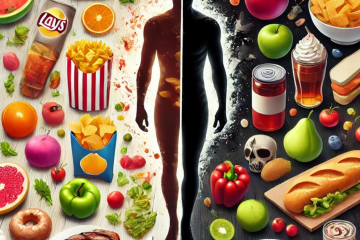


16 Comments
aid ukraine · June 15, 2022 at 10:38 am
Hello my family member! I want to say that this article
is awesome, great written and include almost all significant infos.
I’d like to see extra posts like this . aid ukraine
mohammedasfar · June 16, 2022 at 9:15 am
Thank you!
mohammedasfar · October 2, 2022 at 6:59 am
Thank you! 🙂
Refuges From Ukraine · July 4, 2022 at 6:58 am
magnificent put up, very informative. I’m wondering why the opposite experts of this sector do not notice this. You should continue your writing. I’m sure, you’ve a great readers’ base already!
mohammedasfar · October 2, 2022 at 6:58 am
Thank you! 🙂
Aid Ukraine · July 6, 2022 at 9:10 pm
excellent submit, very informative. I wonder why the opposite experts of this sector don’t realize this. You must proceed your writing. I’m sure, you’ve a huge readers’ base already!
mohammedasfar · October 2, 2022 at 6:58 am
Thank you! 🙂
Twitter Marketing · August 27, 2022 at 12:03 am
fantastic put up, very informative. I wonder why the other specialists of this sector don’t understand this. You should proceed your writing. I’m confident, you’ve a huge readers’ base already!
mohammedasfar · October 2, 2022 at 6:57 am
Thank you! 🙂
Marketing Tips · August 28, 2022 at 12:42 am
magnificent submit, very informative. I ponder why the other specialists of this sector don’t notice this. You must continue your writing. I’m confident, you have a huge readers’ base already!
mohammedasfar · October 2, 2022 at 6:57 am
Thank you! 🙂
https://topphimhot.net · October 17, 2022 at 7:16 am
Best view i have ever seen !